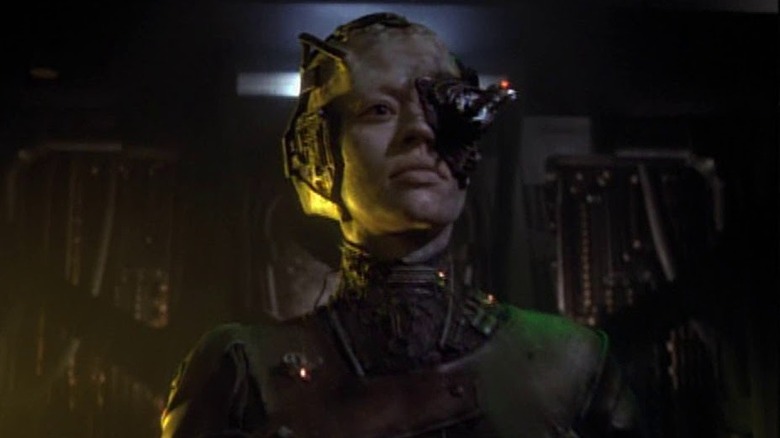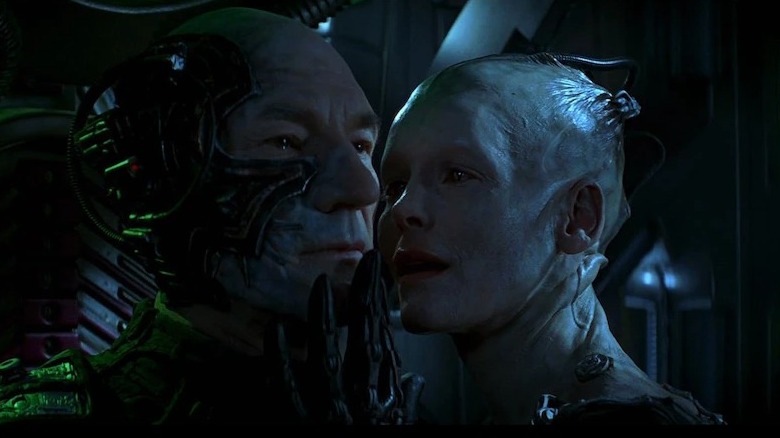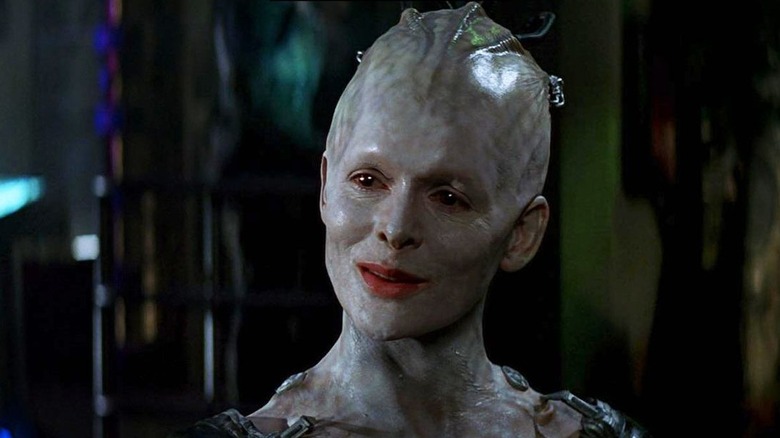Star Trek: Voyager's Scorpion Was Almost A Direct First Contact Sequel
What's the easiest way to have your hero and villain team-up? Introduce a new, even worse villain who can only be defeated by combining forces. "Star Trek: Voyager" did such a move in "Scorpion," its two-part season 3 finale/season 4 premiere where our heroes teamed up with, of all races, the rapacious hive-minded Borg. Before then, the Borg had never been anything but terrifying villains.
Context: "Voyager" follows the crew of the eponymous starship, whose name becomes meaningful when it's flung halfway across the galaxy. (Specifically, the region known as the "Delta Quadrant" by the Federation, which is conversely based in the Alpha Quadrant.) To get home, Voyager will inevitably have to trek through Borg space. By their luck, when they finally get there, the Borg have bigger fish to fry: Species 8472, an interdimensional race who got a little peeved when the Borg invaded their home dimension and now want to wipe out the entire Milky Way.
Voyager develops a countermeasure against the invaders and trades it for safe passage through Borg space. The alliance doesn't last (the Borg, like the scorpion in the titular fable, can't resist their nature to assimilate) but Voyager gets a new crewmate — liberated drone Seven of Nine (Jeri Ryan) — out of it.
"Scorpion" aired in May and September 1997, a year after "Star Trek: First Contact" was a summer blockbuster. That movie radically redefined the Borg by introducing a Queen (Alice Krige) to the Borg — "Scorpion" almost followed up on this idea.
The Borg connect Star Trek: The Next Generation and Voyager
The Borg were the villains of "Star Trek: First Contact," but Jonathan Dolgen (head of Paramount Pictures parent company Viacom) thought the movie needed a more personal villain. Thus, the Borg Queen was born.
In June 1997 (during the wait for "Scorpion Part 2") episode co-writer Brannon Braga told "Star Trek Monthly" that he considered including a line about the Borg Queen's demise in "First Contact," and that her death was another reason why the collective was weakened. He ultimately decided it would be needless exposition: "The last thing you want to do in a big, sweeping two-parter is to start explaining a movie that half the audience may not have seen."
However, the idea of a single Borg interacting with the main characters as a voice for the whole helped inspire Seven of Nine. The Queen also eventually appeared on "Voyager" as a recurring villain (played first by Susanna Thompson, then Krige again in series finale "Endgame"). The implication was that she had back-up bodies so her "First Contact" death was a mere hindrance.
How the Borg Queen redefined Star Trek's best villains
Many Trekkies are split on the role of the Borg Queen and how she squares with the prior depictions of the Borg as lacking individual leadership. Doubly so since in "First Contact," the Queen is retconned into the events of "Next Generation" episode "The Best of Both Worlds," where the Borg assimilated Captain Picard (Patrick Stewart) and dubbed him Locutus of Borg. According to the episode (which doesn't present the Borg as anything but a hive mind), Locutus was created to be a spokesman to humanity before their assimilation. "First Contact" instead declares that the Queen wanted a mate.
I think it can still work if the Queen is viewed not as a true individual, but as an avatar of the collective; not a leader, but the gestalt mind of trillions puppeteering a single body for better interaction with the heroes. In "First Contact," the Queen declares to Data (Brent Spiner) that "I am the collective" but doesn't elaborate.
Unfortunately, canon material doesn't really follow this idea. "Voyager" depicts the Queen more as a leader; "Endgame" even has her talking to the collective's voice and ordering it around. The Queen returns in "Star Trek: Picard" season 3 carrying out a personal vendetta against Starfleet too. Braga's notion that the Queen was an irreplaceable leader also suggests the "Star Trek" writers weren't rolling with the "avatar" idea.
As it stands, "Scorpion" was the last time we see the original Borg, where they are a faceless disembodied hive mind. If Braga had decided to follow-up on "First Contact" and prematurely write the Queen out of "Voyager," maybe that's the way they would've stayed.


